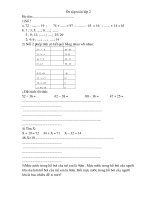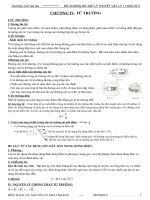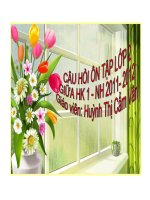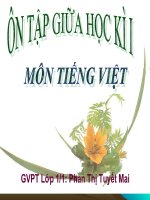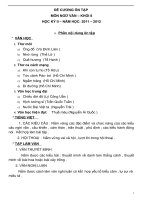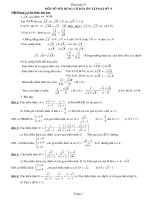Tiếng anh 10: Bài giảng Ôn tập lý thuyết giữa học kỳ II
Bạn đang xem bản rút gọn của tài liệu. Xem và tải ngay bản đầy đủ của tài liệu tại đây (492.71 KB, 4 trang )
REVIEW UNIT 9,10, 11, 12
Môn: Tiếng Anh 10 chương trình cơ bản
Thầy giáo: Nguyễn Kim Long
A. Review Vocabulary
Unit 9. Unsersea World
Names of oceans
Pacific Ocean: Thái Bình Dương
Atlantic Ocean: Đại Tây Dương
Indian Ocean: Ấn Độ Dương
Antarctic Ocean: Nam Băng Dương
Southern Ocean: Nam Băng Dương
Arctic Ocean: Bắc Băng Dương
Marine life
- biodiversity (n): đa dạng sinh học
- starfish (n): sao biển
- seal (n): hải cẩu
- jellyfish (n): sứa biển
- turtle (n): rùa
- shark (n): cá mập
- blue whale (n): cá voi xanh
- sperm whale (n): cá voi họ nhà táng
Unit 10. Conservation
- species (n): các giống loài
- animal variety (n): sự đa dạng của động vật
- wood (n): gỗ
- wildlife (n): động vật hoang dã
- water circulation (n): vòng tuần hoàn của nước
- nature‟s defence: bảo vệ tự nhiên
- endangered animals (n): các loài động vật bị đe dọa
- forest fire (n): cháy rừng
- forester (n): kiểm lâm
Unit 11. National Parks
- the first of Vietnam‟s nine national parks: một trong chín vườn quốc gia đầu tiên ở Việt Nam.
1 Truy cập trang để học Toán – Lý – Hóa – Sinh – Văn – Anh – Sử Địa – GDCD tốt nhất!
- the habits of animals: thói quen của động vật
- orphaned and abandoned animals: các loài thú bị mồ côi hoặc bị bỏ rơi
- a sub – tropical wilderness: khu bảo tồn cận nhiệt đới
- temerate zones: vùng ôn đới
- an increase in population: tăng về số lượng cá thể
- the 1000 – year –old tree: cây cổ thụ 1000 tuổi
- ethnic minority (n): dân tộc ít người
Unit 12. Music
- folk music (n): nhạc dân tộc
- rock „n‟ roll: nhạc rock and roll
- pop music: nhạc pop
- classical music (n): nhạc cổ điển
- jazz (n): nhạc Jaz
B. Review Grammar
Unit 9. Should
S + should/ shouldn’t + V: nên/ không nên làm gì
E.g: You should get up early to go to work on time.
You shouldn‟t stay up late for watching TV.
Unit 10. Conditional Sentence Type 2
If today were Tet holiday, I would not go to school.
If clause
Main clause
(+) S + V (in the past)/ were
(+) S + would + V
(-) S + didn‟t + V/ weren‟t
(-) S + would not + V
(?) would + S + V?
Usage: to express untrue or unreal condition at the present.
Unit 11. Conditional Type 3
If clause
Main clause
If + S + past perfect
S + would have + V3
Examples:
I would have phoned you if I had known your phone number.
If she had studied harder, she wouldn’t have failed the exams.
The passive Voice
Examples:
2 Truy cập trang để học Toán – Lý – Hóa – Sinh – Văn – Anh – Sử Địa – GDCD tốt nhất!
- Our environment is being seriously polluted.
- A lot of trees are cut down everyday.
- Everything has been prepared so well.
- The boy was named Peter.
Form: be + P2
Present simple tense: S + is/ am/ are + P2
E.g: The children are taken to school everyday.
Present continuous tense: S + is/ am/ are being + P2
E.g: The hospital is being repaired.
Present perfect tense: S + have/ has been + P2
E.g: He has just been given a gift for his birthday.
Past simple tense: S + was/ were + P2
E.g: The house was painted green.
Past continuous tense: S + was/ were + being + P2
E.g: The cat was being fed when we came.
Past perfect tense: S+ had been + P2
E.g: Before it rained, the seeds had been planted.
Modals in passive: S + modal verbs + be + P2
E.g: The date of the meeting can be changed again.
The poor should be taken care of.
Unit 12.
to + infinitive
Form: What.... for? (Để làm gì )
What do we use “to + V” for?
=> We use “ to + V” to talk about purpose.
Use: to + V trả lời cho câu hỏi “What.... for?”
“Wh-” questions.
When
Time
Where
Place
Who
Person
Why
Reason
What
Object/ idea/ action
How many
Quantity (countable)
3 Truy cập trang để học Toán – Lý – Hóa – Sinh – Văn – Anh – Sử Địa – GDCD tốt nhất!
How much
Price, amount (uncountable)
Wh - + Aux + S + V?
Wh - + Verb?
C. Review Pronunciation
Ending sounds /s/ /z/ /iz/
- es phát âm là /iz/ khi âm cuối của động từ là một trong các âm sau: /tʃ/ (watches), /ʃ/ (washes), /dʒ/
(damages), /ʒ/, /s/ (boxes), /z/ (blouses)
- s phát âm là /s/ khi âm cuối của động từ là một trong các âm sau: /f/ (laughs), /θ/ (mouths), /k/
(books), /p/ (stops)
- s phát âm là /z/ khi âm cuối của động từ là một nguyên âm hoặc các phụ âm còn lại: plays, boys, needs,...
“-ed” : /t/ or /d/ or /id/
• /id/ sau các âm /t/, /d/. E.g: wanted, needed,...
Some special adjectives:
- naked: không quần áo
- wicked: gian trá
- beloved: đáng yêu
- sacred: thiêng liêng
- hatred: lòng căm thù
- wretched: khốn khổ
- rugged: gồ ghề
- ragged: rách rưới, tả tơi
• /t/ sau các âm /tʃ/, /p/, /f/, /k/, /ʃ/, /s/, /θ/ (chính phủ phát kèm theo sổ sách)
E.g: watched, stopped, placed,...
• /d/ sau các nguyên âm và phụ âm còn lại
E.g: played, tried,...
4 Truy cập trang để học Toán – Lý – Hóa – Sinh – Văn – Anh – Sử Địa – GDCD tốt nhất!


